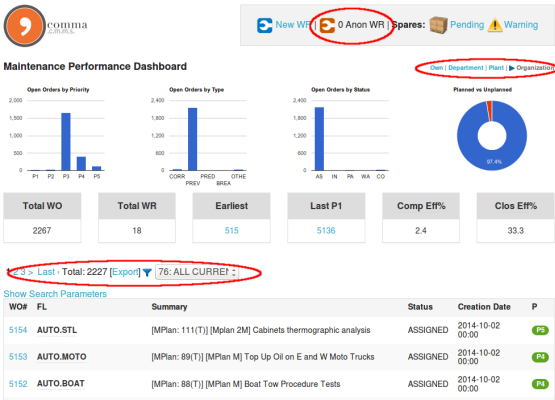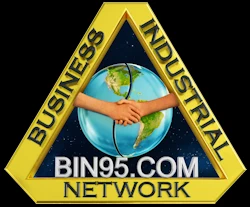CMMS Implementation
- Home >
- articles >
- maintenance-management >
- cmms implementation
CMMS implementation recommendations for Small to Medium Sized Companies
By Rui Alves
Ask any competent maintenance professional if a CMMS is a must-have tool on an efficient and modern maintenance department and the answer will most likely be that it is. With the decrease in cost of highly-reliable and powerful IT equipment, the benefits of a CMMS are well within reach of any organization regardless of size.

The CMMS Industry Overall
The increase in CMMS usage and its growth beyond the larger CMMS industry players is well documented in the "CMMS Best Practices Study" published in July 2011 (Source: Reliabilityweb.com CMMS Best Practices Report 2011). On that study, the section that refers to the CMMS implementation time frame, shows exponential growth in CMMS installations overall from the 1960s to 2010. This is not very surprising given the wider availability of cheaper IT solutions, but it also means, as discussed in the study, "that [the results] speak well of the recognition of CMMS in supporting the effectiveness and efficiency of the maintenance function".
The "CMMS Best Practices Study" also shows that the two largest CMMS vendors in the survey (resourceful yet expensive CMMS applications mainly used by large capital intensive industries) both grew by about 100% from 1990 to 2010. "Smaller" CMMS vendors, however, grew by about 150% during the same time period a fact that, in our opinion, demonstrates implementation growth towards smaller maintenance units.
A Note on Company Sizes
Before proceeding it's beneficial to address the concept of "company size" in what concerns the rest of this article. Because we are referring to a software package that mostly impacts the maintenance function, company size is to be taken in reference to the size of the maintenance department or unit. As such, companies can be classified in the following manner:
- Small if there are between 1 and 15 personnel devoted entirely to maintenance
- Medium if there are between 16 to 25 personnel devoted entirely to maintenance
- Large if there are 26 or more personnel devoted entirely to maintenance
With the size definitions out of the way, we can analyze the current status of CMMS adoption and the challenges ahead for each case with special emphasis on small and large companies given that we can probably assume that medium sized companies will simply behave as a mixture of the two extremes.
What a failed CMMS Implementation Means for Large and Small Companies?
Along with increasing CMMS installations there's a natural increase in reported implementation failures. In general, these failures have different results in what concerns subsequent CMMS adoption depending on the size of the company.
Upon an implementation failure, larger companies tend to benefit from what can be called "positive peer pressure" which stems from the undeniable fact - proven by countless success stories exchanged in trade shows or specialized publications - that a CMMS indeed is the way to go. Management, regulatory agencies or insurance companies all require access to information that can be easily extracted from a CMMS and not having that information is not an option. It may take some time, perhaps even a management change, but sooner or later large companies will at least partially succeed in taking more out of a CMMS than they need to put in.
Nowadays and for large companies, the discussion is not so much if or when a CMMS should be put in place but rather how can the current CMMS be more efficiently used. On the other hand and as expected, smaller companies have a somewhat different behavior: failed implementations are generally not followed by a continuous internal or external push that will eventually result in a successful installation. Smaller companies that do attempt a CMMS and fail tend to not try it again in the short term. There are a few reasons for this:
- Clients and/ or management does not really push for further maintenance optimization
- CMMS data input gives a sense of wasted time that keeps the team from doing what "really matters"
- The existing maintenance management tools are "good enough"
The truth is that a lot of small companies do generate value everyday and do not have a reason to change. Due to a lack of strong "peer pressure" or lack of regulatory requirements a small operation that tries and fails a CMMS implementation is lost for a long time and will continue operations as they are and probably blame the CMMS tool for the failure.
CMMS Recommendations for Small Companies
As described above, large companies have a great deal of support when preventing or recovering from CMMS implementation failures. That is not so much the case for their smaller counterparts. With this in mind, we will now discuss several recommendations that, based on our experience, will increase the chance of a successful CMMS implementation by small maintenance organizations. If you are tasked with improving maintenance management on a small or medium maintenance operation, consider the following points before proceeding:
* Think simple, start simple and act today
Find a reputable package that will match your budget. Most, if not all, of CMMS solutions in the market will do the very basic of maintenance tasks which is what you will most probably need anyway. Do not start trying to have the most optimized system in the world because you will probably fail. Start small, with only what you need.
Design an overall asset hierarchy and add only the basic backbone of items to it. From there, add the assets as they are needed: as the maintenance plans are implemented and as work requests come in. The above has the benefit of yielding quasi-immediate results for tasks you are actually doing today which will make the system useful almost instantly.
* Accept that one size does not fit all
CMMS solutions are multi-featured. Accept that you will use some of these features and will not use others. Also, some features that you do use, may not do absolutely everything you would like. Unless you buy an expensive, proprietary and fully customized CMMS solution, you will have to compromise.
Knowing from the start that there isn't a solution that will perfectly fit your every need will avoid disappointments and will put your mind at work on alternative ways to get the information you need out of the system.
* Force regular quality follow up meetings
In almost every single case we have seen it is the need to report to others (internal and/ or external) - rather than simply the will to better organize operations - that justifies the continuous use of a CMMS specially on the initial stages before it becomes second nature to all.
Committing to regular follow-up reporting to superiors and/ or colleagues is an absolute must, but there's more. It is important to keep people interested by tailoring information to focus on what is important to them. For upper management demonstrate optimized utilization of resources, show saved money in time and spares and comment on number of breakdowns that were prevented. For technicians, follow their successes and concerns and do group meetings to analyze overall maintenance team performance.
Final Comments:
A computerized maintenance management system is a valuable tool no matter the organization size. As with most things, there is no guaranteed formula but years of experience have shown that there are some key points more likely to lead to success than others.
For small companies the following flow has the most potential: recognize the need, start simple and enforce regular, meaningful follow ups.
There will be a time when small companies will look back and wonder how was it possible to operate without a CMMS. We're not quite there yet but we are well on the way.
About the Author:
Rui Alves is CEO of Parafernalia Ltd, a Hong Kong and Macau based company that develops Comma CMMS, a cloud-based CMMS solution specially targeted at small to medium sized companies.
Related training products:
